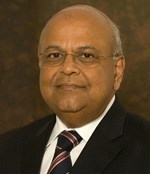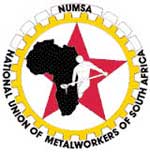The government is facing a growing chorus of criticism from across the political spectrum over the uncertainty of its economic policies‚ with strikes‚ inflexible labour laws and a sharp slowdown in its infrastructure roll-out being identified as brakes on growth.

Pravin Gordhan (Image: GCIS)
A costly strike in the vehicle manufacturing sector‚ which prompted German car maker BMW to shelve its plans for expansion in South Africa‚ is seen by many as a tipping point for the country‚ with investors growing increasingly wary of unstable labour relations and policy drift.
With growth set to come in at just 2% this year‚ way below what analysts say is necessary to create the jobs that will make a significant dent on poverty‚ and with elections looming next year‚ the government is under mounting pressure to show leadership and provide direction.
Its National Development Plan (NDP) has been widely welcomed but even within the ranks of the ruling alliance it is the subject of bitter contestation.
Interventions and opinions
The government's view‚ restated by Finance Minister Pravin Gordhan in an interview this week‚ is that strikes are part of normal industrial practice.
On Tuesday‚ however‚ in four separate interventions‚ calls for decisive action were made.
Opening the Ahmed Kathrada annual conference in Sandton‚ African National Congress (ANC) veteran Mathews Phosa said the government must end years of policy instability by resolving to pursue its policies to their conclusion.
In reacting to criticism‚ said Phosa‚ the state must resist the kind of populist rhetoric that has sunk the economies of some post-liberation African countries.
He said that in the interests of retaining confidence and attracting investment‚ South Africa needed to come to the point where "we are able to predict what will happen in the next three years".
Criticism of all policies was to be expected‚ but the state should stick to its guns until such criticism could be used to strengthen existing plans‚ such as the NDP‚ Phosa said. "You don't walk away from what you have decided or nobody will trust you," he said.
Phosa said South Africa needed to move beyond using rhetoric in decision-making‚ as the history of many countries north of South Africa showed there is a price for populism. "While this may work for a while‚ hunger followed and countries were forced to go back to the International Monetary Fund (IMF) for restructuring," he added.
Numsa's standpoint
National Union of Metalworkers of South Africa general secretary Irvin Jim blamed what he called the "apartheid structure" of the economy and the government's anti-worker policies.
He shrugged off criticism of the motor industry strike‚ and said the government had to be firm‚ take bold policy positions and stop dithering due to fears of capital flight.
"Elements in the state such as Trade and Industry Minister Rob Davies were on the right track‚" he said‚ but the Treasury was moving in the opposite direction. Jim said capital was on strike‚ and that investors were refusing to invest.
"This could only be rectified by a government that is prepared to act decisively. The government is failing to do a couple of things‚ to intervene decisively in the economy‚ to lead by example," Jim added.
"Do you want investment? Are you leading by example? Do you have a national agenda? I don't think so. I think we have not succeeded in convincing the ANC government to champion manufacturing and industrialisation‚ or they have absolutely no clue or belief that countries that have survived even this global crisis are countries that have said to themselves manufacturing matters," he added.
Nationalisation calls
State intervention meant nationalising the commanding heights of the economy‚ a debate the ANC effectively quashed at its national conference last year. Jim and Numsa are the most vocal critics of the NDP‚ saying it mimics Democratic Alliance policies.
"I don't think capital even fears nationalisation. If we were to take a bold decision and nationalise our own mineral resources and also spell out clearly in terms of policy that this is how capital would make money‚ this is how we would use the fact that we own and control those sectors. Capital wants certainty. They want to be certain that there is a policy direction. So there is no capital that has got 'flu purely because we talk about investment‚" Jim said.
Public Enterprises Minister Malusi Gigaba‚ at the Convention of the Association of Municipal Electricity Utilities‚ said Africa was on the brink of a significant opportunity in infrastructure schemes. "But private investors typically had certain preconditions before they would commit to projects with lengthy payback periods that attach to infrastructure assets.
"They want to be involved in projects that are high priority for governments and thus are likely to come to a conclusion‚" he said.
"They do not want to be involved in projects where there are no clear implementation timelines or where the timelines are repeatedly moved out. They will also focus on markets where there is a guarantee of long-term policy stability and revenue certainty and where there is institutional capacity within government to make projects happen," Gicaba said.
Bottlenecks to growth
On Tuesday (8 October)‚ the IMF said South Africa's infrastructure bottlenecks and labour market inflexibility require decisive progress in being addressed and are key to unlocking much-needed economic growth.
"A further slowdown or sudden stops in capital inflows and the potential for more strikes are risks to the 2% economic growth outlook‚" the IMF said. "South Africa's vulnerability to these risks could be triggered by a global repricing of risk or rising industrial tension. Reforms to strengthen education and the effectiveness of government services and increase product market competition and labour market flexibility would help," it said.
Political analyst Nic Borain said that business was inherently risky. "While you can't commit to 40 years of absolute certainty in this environment a regulatory environment with no mixed messages was necessary," he said.
This was evident in the severe conflict over the NDP and changes in the labour regulatory environment which happened when (business) made its desires quite clear.
Efficient Group chief economist Dawie Roodt said labour issues would be quickly addressed if all unions showed a united front and the Congress of South African Trade Unions was not part of a tripartite alliance with the ANC.







































